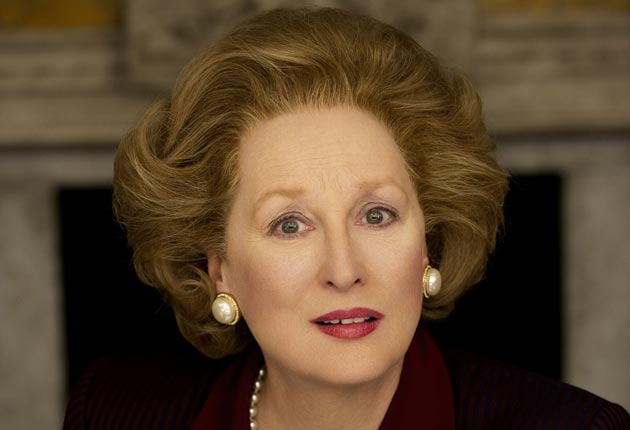David Lister: Make up alone won't turn Meryl into Margaret
The Week in Arts

The face adorned the front pages of several newspapers this week. The hair, the mouth, the twin set and pearls were all familiar. Margaret Thatcher was back, this time in the guise of Meryl Streep, or the other way round. Streep is playing the former PM in a film to be released later this year, and the first still from the set showed what some thought an uncanny resemblance.
Actually, I don't think so. I say it hesitantly, for while one can still insult Margaret Thatcher with impunity, demeaning Meryl Streep is akin to trashing Judi Dench or the late Queen Mother. But, I don't really see Mrs T in the picture of Streep. The face is too expressionless, the eyes too vacant. Where is the glint of steel and determination of the original, and the impatient expression saying there is too much work to be done to be posing for pictures? This picture looks like Margaret Thatcher meets Doris Day.
But, with Streep's undoubted talent, all will probably be all right on the night of the film's opening. I hope so, because, strangely, we care disproportionately how people who figured in our own lives are portrayed. Meryl Streep can do what she wants with Lady Macbeth or Cleopatra; it's her prerogative to bring her own interpretation to the part. But if she doesn't deliver the Margaret Thatcher we know and love, or hate, then she's got it "wrong".
I once discussed with a Conservative minister who served in both the Thatcher and Major cabinets who might play the two leaders on stage or in opera. He said that Mrs Thatcher "could always be heard at the back of the theatre" so it must be someone with a mighty and intimidating voice. Of John Major he said, a little disrespectfully I thought, that the role should go to a countertenor.
Casting film stars to play our rulers is a pleasant enough pastime. Thankfully, Michael Sheen has nabbed Tony Blair, seemingly in perpetuity. He has the look and the mannerisms; he can act, and he's British too. That aspect is a matter not much discussed in polite society, but there are of course numerous British actresses who could play Margaret Thatcher. Lindsay Duncan and Andrea Riseborough have already done so on the small screen convincingly. But there aren't numerous British actresses who could fill the multiplexes in the way that Meryl Streep can.
Besides, she is such an accomplished actress that nationality really doesn't matter. I feel less confident in another piece of casting, which was announced this week. The American former child star Dakota Fanning, now 16, and last seen in raunchy rock biopic The Runaways, is to play the young Princess Margaret in a film about the late princess's teenage years. It's not quite Miley Cyrus giving us her Ann Widdecombe, but it's a little hard to imagine, nevertheless.
Perhaps Michael Sheen is one of the last Brits to play famous Brits. But hold on, there's the new darling of Hollywood, Colin Firth. He already has a monarch under his belt. He should put in quick for Harold Wilson or Harold Macmillan or David Cameron before Dakota starts telling her friends.
Some things are beyond definition
The great and the good of the arts world gathered in London on Thursday for the annual State of the Arts conference. Much of the time and many of the speeches were inevitably devoted to the cuts, and the coming decisions from the Arts Council on which bodies to cease funding altogether. But not everyone was making a simple anti-cuts case. The Royal Society of Arts, which was a co-organiser of the event, produced a pamphlet for the conference called "Arts Funding, Austerity and the Big Society", which urged the arts sector to strengthen its case for money. It said that it must provide stronger evidence of the positive impact of arts on society, and must come up with more precise definitions of artistic excellence.
That's an awkward one to hurl at a gathering of arts worthies. Artistic excellence is talked about all the time. But to define it?! We'd better have another conference.
From Burma to Brighton? Not really
The Brighton Festival announced on Wednesday who its guest artistic director would be for this year's three-week jamboree in May. It's fair to say it was a surprise. No up-and-coming arts centre chief from Hove, but Aung San Suu Kyi, Burmese opposition figurehead, Nobel Peace laureate and world hero. I hope they don't make her sort out the catering at the Royal Pavilion or tackle the problems of seafront parking. In fact, she won't be burdened with any of the minutiae of running an arts festival, because she will be, as she put it in a statement this week, "watching the festival take place, remotely".
Her name alone will, of course, give the festival an even higher profile than usual. But I would worry if having famous political figures direct festivals remotely became a habit. Will Glyndebourne be on the phone to Nelson Mandela? Is the head of the Muslim Brotherhood now a shoo-in for the Buxton Music fest? I rather cling to the old-fashioned idea of festival directors actually putting in an appearance on the ground – even if they haven't participated in global struggles.
Join our commenting forum
Join thought-provoking conversations, follow other Independent readers and see their replies
Comments
Bookmark popover
Removed from bookmarks